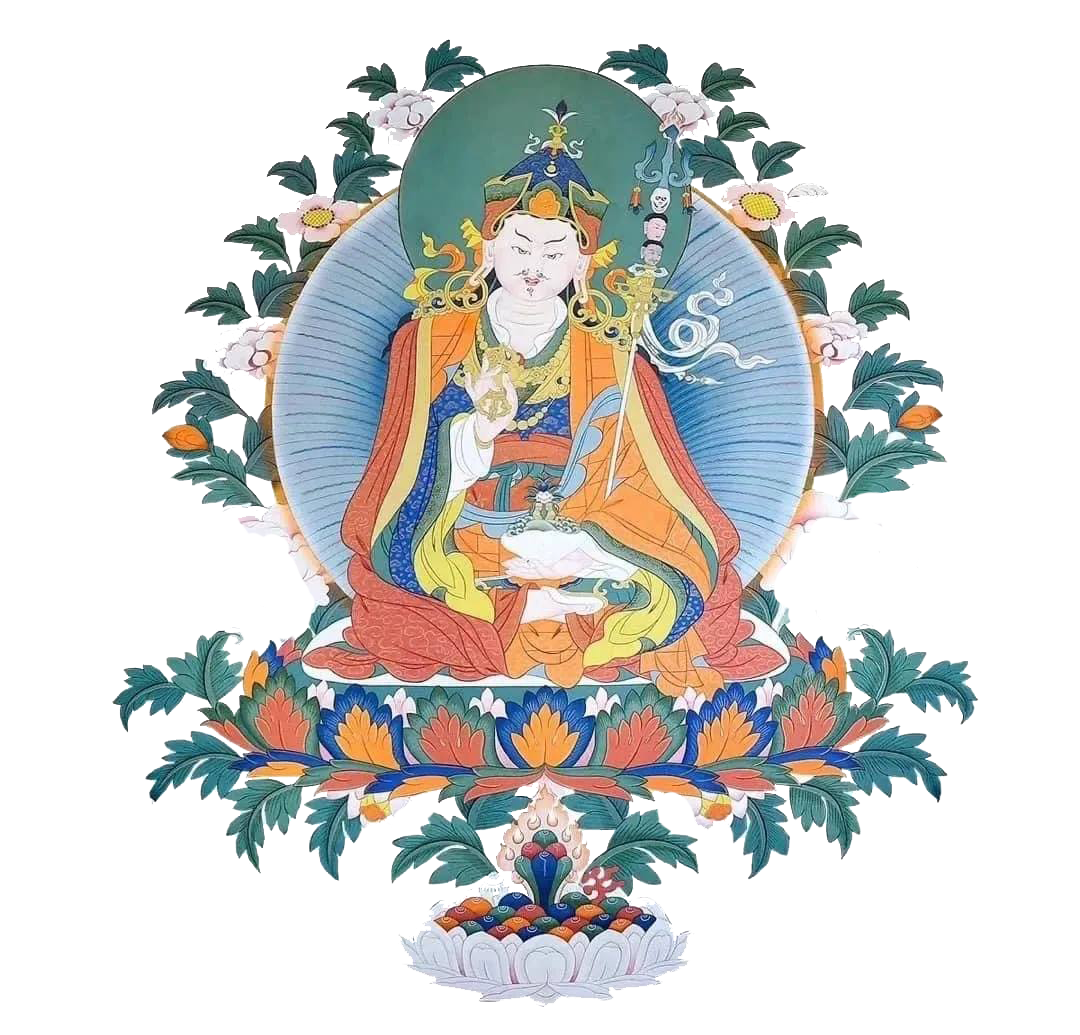About Us
རྙིང་དགོན་པདྨ་རིག་འཛིན་གླིང་།
Padma Rigdzin Ling Buddhist Temple is based on the teachings of Buddha Sakyamuni, the Buddha of our time. He was born in this world to turn the wheel of Dharma so that all sentient beings in samsara wake up from their ignorance and suffering, which has lasted for innumerable cyclic existences. We follow his teachings and believe that his consciousness returned as Padmasambhava, the great master who spread the teaching of Vajrayana in Tibet and hid innumerable spiritual treasures for future generations.
Our lineage goes back more than a thousand years, when Padmasambhava gave the transmission of the Kagye Puja to his disciples. They transmitted it to their students and continued on to our master, Lama Jigme Namgyal Rinpoche. We follow the Nyingma Buddhist tradition carried by our Lama, who from a young age studied with his root teacher Rigdzin Jigme. He has since been practicing and performing all the ceremonies for the enlightenment of all sentient beings and their awakening from suffering, ignorance and cyclic existences.
- We believe in the Four Noble Truths as taught by the Sakyamuni Buddha: There is suffering. There is a cause to suffering. There is an end to suffering. There is a path out of suffering.
- We believe in how difficult it is to attain a human body with all its freedoms and advantages in order to practice the Dharma.
- We believe that everything in life, the outer universe and its beings are all impermanent. Everything that arises from the interaction of the five elements in the universe is bound to change. The nature of this impermanence is in its essence emptiness.
- Samsara is the cycle of existence in which one is endlessly propelled by negative emotions and the karmic force of one’s actions from one state of rebirth to another. There are six realms or modes of existence caused and dominated by a particular mental poison: the realms of hells (anger), of pretas (miserliness), of animals (bewilderment of ignorance), of humans (desire), of demigods (jealousy) and of gods (pride).
- We believe in the law of karma, which is the principle of cause and effect or the result produced by past actions.
- We believe anyone can accomplish Buddhahood and Inner Peace through the development of a genuine compassionate heart.
- We believe in “Words of my Perfect Teacher” by Patrul Rinpoche to be the preliminary studies of Buddhism that any student should practice to ground the basis of his/her Buddhist way of life.
- We believe in the three stages of a Buddhist practitioner throughout his lifetime to become realized:
a The Ngondro practice
As according to the Longchen Nyingthig Ngondro, which is the basis of any Buddhist practitioner according to our tradition:
The Ngondro Accumulation
- Taking Refuge, the foundation stone of all paths (100,000 recitations of the Refuge Mantra).
- Arousing Bodhicitta, the root of the Great Vehicle (100,000 recitations of the Bodhicitta Mantra).
- Meditation and recitation on the teacher as Vajrasattva to cleanse all obscurations (100,000 recitations of The Hundred Syllables, along with three million recitations of Vajrasattva’s Heart Mantra).
- Offering the mandala to accumulate merit and wisdom (100,000 offerings of the mandala).
- Cho, The Kusali’s Accumulation (three million recitations of ‘Om ah hung’).
- Guru Yoga, entrance-way for blessings, the ultimate method for arousing the wisdom of realization (three million recitations of the Vajra Guru Mantra). Also part of Guru Yoga is to make 100,000 prostrations.
b The stage of empowerments for different practices:
- Tsa Lung Trulkor
- Yidam
- Meditation
- Others
c The integration of the student’s consciousness with the Lama’s consciousness.
CODE OF CONDUCT
The ten non-virtuous actions to be avoided:
- Taking life
- Taking what is not given
- Sexual Misconduct
- Lying
- Sowing discord
- Harsh speech
- Worthless chatter
- Covetousness
- Wishing harm on others
- Wrong views that actions cause no karmic effects and the views of eternalism and nihilism.
The positive actions to be adopted:
The three (3) positive acts of the body are:
- Protect the lives of living beings
- Practice generosity
- Follow the rules of discipline
- Speak the truth
- Reconcile disputes
- Speak pleasantly
- Recite prayers
The three (3) positive acts of the mind are:
- Learn to be generous
- Cultivate the desire to help others
- Establish in yourself an authentic view
ངའི་མི་ཚེས་འདི་ཡི་ནང་ལ་སྐྱབས་
Taking a refuge vow
༄༅། །བྱང་སྡོམ་བླང་ཆོག་དཔལ་སྤྲུལ་གསུང་རྒྱུན་ལྟར་བཀོད་པ་བཞུགས་སོ། །
The Ritual for the Bodhisattva Vow, Arranged According to the Tradition of Patrul Rinpoche


